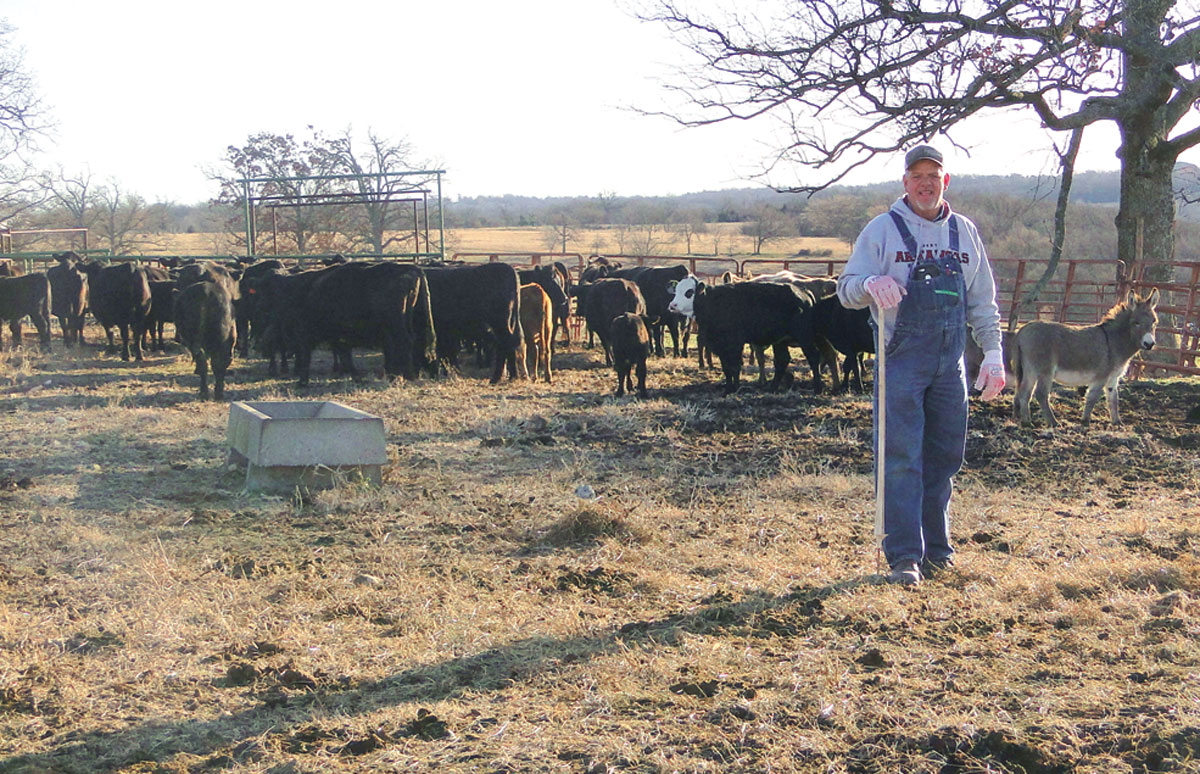
Love of the land creates a unique partnership
PRAIRIE GROVE, ARK. – Although Bob Daughtery was raised on a farm, he is a businessman and not a farmer. Nonetheless, he loves the family history on the two farms he owns. One of his businesses was Lincoln Supply in Lincoln, Arkansas, where he sold tractors. In 1978, he hired a young man named Gene Eneks who was also raised on a farm, this one east of Morrow. Gene was Bob’s “go to” guy for whatever needed to be done. Then ten years ago, summers became extremely hot and dry three years in a row. Equipment sales dropped significantly and the business added working on tractors for resale to help remediate the problem but the business ceased being profitable.
Bob then closed the business but still had the farms. Not wanting to lose a valuable employee, he offered Gene a job on the farm. Not long after, Bob’s aging farm manager broke his hip which made Gene the day-to-day manager while Bob continued controlling important decisions. Gene lives in a house Bob owns on one of the farms with a sign humorously proclaiming “Gomer’s Farms,” after one of Gene’s nicknames from years ago.
“Bob is good to work for, for a of number reasons, one of which is he keeps us well-equipped which includes three feed trucks,” Gene said.
Gene works the 1000 acre farm along with farmhand Forrest Dobbs. The Prairie Grove farm has a mostly Red Angus herd bred by three Red Angus bulls and one fullblood Hereford bull. The Morrow farm has 140 cows bred by five Irish Black bulls along with one Charolais and one Hereford bull.
The Irish Black breed was developed during the 1900s by line breeding Eastern European Friesian bulls and proven American bred commercial females using performance-based selection. Bob selected Irish Black bulls because the breed is known for its calving ease and low birth weights as well as an excellent maternal pelvic area. Maybe even more importantly, the carcasses are known for low back fat, superior yield grade, excellent marbling and a large ribeye area along with a high percent yield.
One of Bob’s decisions was to not pull the bulls off the cows. The result is having calves year-round with every effort made to keep a cow from calving more than once in a year. Cows are culled when they have a dead calf, raise a poor-quality calf or abandon one. Females are replaced by young cows rather than replacement heifers. Bulls are culled when they reach 6 or 7 years of age or if they cannot breed. Any temperamental animals are also sold.
The cattle are gathered and worked twice a year by outsourced help. During that time the herd is vaccinated, wormed, and castrated. They are also separated for sale with calves under 300 pounds being retained for the next cycle and calves over 300 pounds going to the sale barn. Few fly issues occur at the Prairie Grove location, but the Morrow property is next to a chicken farm and trying to keep the flies at bay by any means simply does not work.
The cattle are mostly grass fed with pre-mixed grain stored in grain bins and offered once or twice a month along with some cubes. The purpose is to condition them to come when Gene wants.
“We don’t chase cattle, we want to lead them,” Gene said.

The cattle are moved from pasture to pasture when the grass gets short. Cattle are also moved after winter to maintain grass health and set aside for haying, usually producing enough hay for their needs.
“We produce as many as 3000 bales a year and sell the extra which helps offset the $40,000 spring fertilizing cost with the application of that fertilizing outsourced.
Another farm practice is over seeding with rye every year. The fields that are selected for over seeding are switched every year. That allows time for the land and the grasses to rest and become better conditioned for another round of regular grazing.
Gene explained that armyworms have been a problem in the area this year and very recently forced their most recent hay harvest to be done early due to an invasion of them. When discovered, Gene and Forrest harvested for three full days to save what they could of the current crop. The Prairie Grove farm produced only 120 out of a typical 750 bales while the Morrow land produced only 40 out of a typical 600.
“Most of the time the armyworms are dormant and rain seems to slow them down while a month of hot and dry conditions starts the feeding frenzy,” Gene explained. “As far as we can tell, pesticides don’t work well and are very expensive.”
Bob loves the family land and Gene loves the work with both agreeing that making a good profit is difficult. They feel farming is one of those things that require love and passion so having these farms are perfect for both. Gene loves farming chores whether that is working with the cattle, haying, brush hogging or maintaining the equipment. He also appreciates that he’s not on any kind of a timeline as long as the work gets done which leaves time for fishing Bob’s ponds and taking a trip to South Dakota once in a while.
Gene commented, “Bob’s a good Christian man and takes care of me and has provided me with a place to live for life while I’m living a lifestyle I love. It can’t get much better than that!”







